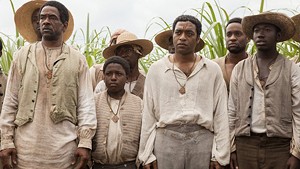Where are the serious American films about slavery? And how did I fail to note the paucity of pictures addressing our national dirty laundry? Just one of the great things about this great new movie is that it shines a light on a significant cinematic hypocrisy.
Virtually every year, some film attracts award-season buzz with a saga set against the backdrop of Nazi Germany. Filmmakers revisit this shameful chapter as though it’s the only well to go to for examples of man’s inhumanity to man.
Meanwhile, as 12 Years a Slave reminds us, American storytellers have zero need to look elsewhere for instances of systematized inhumanity. And yet the list of sagas about slavery is astonishingly short.
One of the earliest — The Birth of A Nation (1915) — was actually pro-slavery! Gone With the Wind (1939) didn’t give a damn. Mandingo (1975) turned the subject into softcore cheese. Beloved (1998) gave us a heart-tugging, Oprah-flavored take on indentured servitude. A TV miniseries or two aside, that brings us to 2012’s Django Unchained. More Holocaust dramas get made in the course of the average presidential administration.
Well, it took a Brit to get the job done, but we finally have it: a nightmare snapshot of plantation life from the viewpoint of a slave. How authentic is the portrait? Not only does it tell a true story but the remarkable individual whose story it is has a writing credit. Right there on the Internet Movie Database: “Writers: John Ridley (screenplay), Solomon Northup (based on ‘Twelve Years a Slave’ by).” Never mind how long it’s been since you saw a serious movie about slavery — when have you ever seen a movie credit for an honest-to-God slave?
Chiwetel Ejiofor is simply magnificent as Northup, a free man living in Saratoga, N.Y., with his family in 1841 when he’s offered a gig fiddling for an out-of-town circus. After celebrating with his two recruiters, he awakes to find himself shackled on the floor of an empty basement. With its echoes of Saw, the scene suggests the opening of a horror film. That’s exactly what it is.
Steve McQueen (Shame) and Ridley remain faithful to Northup’s 1853 memoir as they chronicle an intelligent man’s descent into a hell beyond comprehension. As a casually creepy slave dealer, Paul Giamatti plays about as far against type as an actor can. He displays his human merchandise, stripped of clothing and dignity, in an incongruously civilized parlor, inviting shoppers with a musical pitch: “What catches your fancy, inspect at your leisure...”
Northup realizes survival will require hiding his ability to read and write, so no letters begging for help are dispatched. When he winds up at the mercy of a perpetually drunken Louisiana cotton baron (Michael Fassbender), it’s strictly heart of darkness time. What we witness ranks with the most chilling of movie Looney Tunes creations.
Edwin Epps lynches, rapes and generally terrorizes his workers. Hell, that’s the job description. What sets him apart are little innovations like waking his slaves, inviting them into his home and ordering them to dance as part of a crazy pantomime of a party. His whippings, let’s just say, are not for the delicate. They’d give Mel (The Passion of the Christ) Gibson bad dreams.
The director’s exquisite compositions, the extraterrestrial poetry of the period dialogue and some of the year’s most searing performances combine to make this film a more-than-worthy companion to Spielberg’s monumental Lincoln. Both are masterworks. Watch McQueen’s first, and the significance of Spielberg’s will come into full and horrifying focus. Between them, the real story of human bondage in the land of the free is finally told. Better late than never.















































